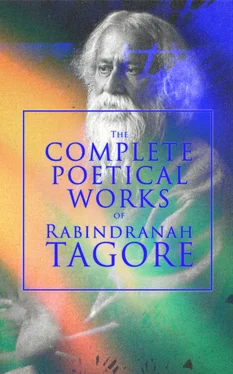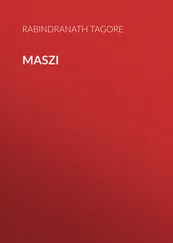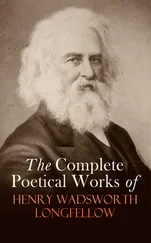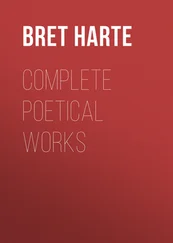"I die into the fulness," said my life to me.
The Earth said, "My lights kiss your thoughts every moment."
"The days pass," Love said, "but I wait for you."
Death said, "I ply the boat of your life across the sea."
Table of Contents
Tulsidas, the poet, was wandering, deep in thought, by the
Ganges, in that lonely spot where they burn their dead.
He found a woman sitting at the feet of the corpse of her dead husband, gaily dressed as for a wedding.
She rose as she saw him, bowed to him, and said, "Permit me,
Master, with your blessing, to follow my husband to heaven."
"Why such hurry, my daughter?" asked Tulsidas. "Is not this earth also His who made heaven?"
"For heaven I do not long," said the woman. "I want my husband."
Tulsidas smiled and said to her, "Go back to your home, my child.
Before the month is over you will find your husband."
The woman went back with glad hope. Tulsidas came to her every day and gave her high thoughts to think, till her heart was filled to the brim with divine love.
When the month was scarcely over, her neighbours came to her, asking, "Woman, have you found your husband?"
The widow smiled and said, "I have."
Eagerly they asked, "Where is he?"
"In my heart is my lord, one with me," said the woman.
Table of Contents
You came for a moment to my side and touched me with the great mystery of the woman that there is in the heart of creation.
She who is ever returning to God his own outflowing of sweetness; she is the ever fresh beauty and youth in nature; she dances in the bubbling streams and sings in the morning light; she with heaving waves suckles the thirsty earth; in her the Eternal One breaks in two in a joy that no longer may contain itself, and overflows in the pain of love.
Table of Contents
Who is she who dwells in my heart, the woman forlorn for ever?
I wooed her and I failed to win her. I decked her with wreaths and sang in her praise.
A smile shone in her face for a moment, then it faded.
"I have no joy in thee," she cried, the woman in sorrow.
I bought her jewelled anklets and fanned her with a fan gem-studded; I made her a bed on a bedstead of gold.
There flickered a gleam of gladness in her eyes, then it died.
"I have no joy in these," she cried, the woman in sorrow.
I seated her upon a car of triumph and drove her from end to end of the earth.
Conquered hearts bowed down at her feet, and shouts of applause rang in the sky.
Pride shone in her eyes for a moment, then it was dimmed in tears.
"I have no joy in conquest," she cried, the woman in sorrow.
I asked her, "Tell me whom do you seek?"
She only said, "I wait for him of the unknown name."
Days pass by and she cries, "When will my beloved come whom I know not, and be known to me for ever?"
Table of Contents
Yours is the light that breaks forth from the dark, and the good that sprouts from the cleft heart of strife.
Yours is the house that opens upon the world, and the love that calls to the battlefield.
Yours is the gift that still is a gain when everything is a loss, and the life that flows through the caverns of death.
Yours is the heaven that lies in the common dust, and you are there for me, you are there for all.
Table of Contents
When the weariness of the road is upon me, and the thirst of the sultry day; when the ghostly hours of the dusk throw their shadows across my life, then I cry not for your voice only, my friend, but for your touch.
There is an anguish in my heart for the burden of its riches not given to you.
Put out your hand through the night, let me hold it and fill it and keep it; let me feel its touch along the lengthening stretch of my loneliness.
Table of Contents
The odour cries in the bud, "Ah me, the day departs, the happy day of spring, and I am a prisoner in petals!"
Do not lose heart, timid thing! Your bonds will burst, the bud will open into flower, and when you die in the fulness of life, even then the spring will live on.
The odour pants and flutters within the bud, crying, "Ah me, the hours pass by, yet I do not know where I go, or what it is I seek!"
Do not lose heart, timid thing! The spring breeze has overheard your desire, the day will not end before you have fulfilled your being.
Dark is the future to her, and the odour cries in despair, "Ah me, through whose fault is my life so unmeaning?
"Who can tell me, why I am at all?" Do not lose heart, timid thing! The perfect dawn is near when you will mingle your life with all life and know at last your purpose.
Table of Contents
She is still a child, my lord.
She runs about your palace and plays, and tries to make of you a plaything as well.
She heeds not when her hair tumbles down and her careless garment drags in the dust.
She falls asleep when you speak to her and answers not—and the flower you give her in the morning slips to the dust from her hands.
When the storm bursts and darkness is over the sky she is sleepless; her dolls lie scattered on the earth and she clings to you in terror.
She is afraid that she may fail in service to you.
But with a smile you watch her at her game.
You know her.
The child sitting in the dust is your destined bride; her play will be stilled and deepened into love.
Table of Contents
"What is there but the sky, O Sun, that can hold thine image?"
"I dream of thee, but to serve thee I can never hope," the dewdrop wept and said, "I am too small to take thee unto me, great lord, and my life is all tears."
"I illumine the limitless sky, yet I can yield myself up to a tiny drop of dew," thus the Sun said; "I shall become but a sparkle of light and fill you, and your little life will be a laughing orb."
Table of Contents
Not for me is the love that knows no restraint, but like the foaming wine that having burst its vessel in a moment would run to waste.
Send me the love which is cool and pure like your rain that blesses the thirsty earth and fills the homely earthen jars.
Send me the love that would soak down into the centre of being, and from there would spread like the unseen sap through the branching tree of life, giving birth to fruits and flowers.
Send me the love that keeps the heart still with the fulness of peace.
Table of Contents
The sun had set on the western margin of the river among the tangle of the forest.
The hermit boys had brought the cattle home, and sat round the fire to listen to the master, Guatama, when a strange boy came, and greeted him with fruits and flowers, and, bowing low at his feet, spoke in a bird-like voice—"Lord, I have come to thee to be taken into the path of the supreme Truth.
"My name is Satyakâma."
"Blessings be on thy head," said the master.
"Of what clan art thou, my child? It is only fitting for a
Brahmin to aspire to the highest wisdom."
"Master," answered the boy, "I know not of what clan I am. I shall go and ask my mother."
Thus saying, Satyakâma took leave, and wading across the shallow stream, came back to his mother's hut, which stood at the end of the sandy waste at the edge of the sleeping village.
The lamp burnt dimly in the room, and the mother stood at the door in the dark waiting for her son's return.
She clasped him to her bosom, kissed him on his hair, and asked him of his errand to the master.
Читать дальше












